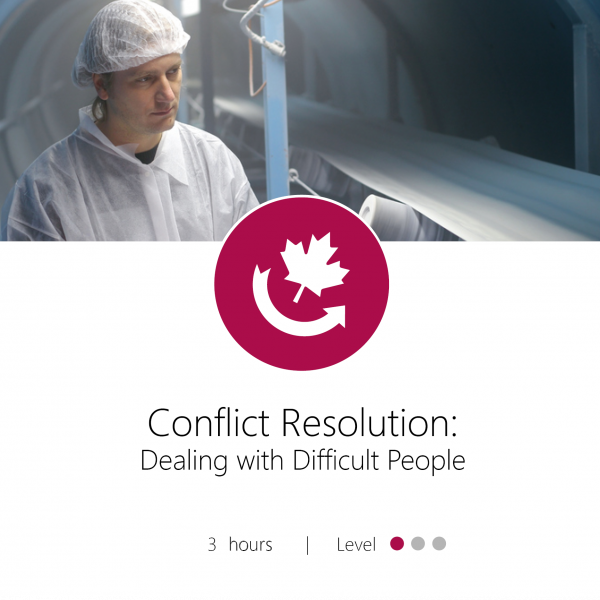Conflict Resolution – Dealing With Difficult People
$190.00
Success comes from understanding how we behave, as well as how we can influence others. If difficult interactions are necessary, and we approach those conversations with a plan, we will find that we have less difficult people to deal with. More often than not, we will also have more meaningful and significant conversations.
Available!
Success comes from understanding how we behave, as well as how we can influence others. If difficult interactions are necessary, and we approach those conversations with a plan, we will find that we have less difficult people to deal with. More often than not, we will also have more meaningful and significant conversations.
Learning Objectives
After completing this course, you will understand:
- Recognize how your own attitudes and actions affect others.
- Find new and effective techniques for dealing with difficult people.
- Learn some techniques for managing and dealing with anger.
- Develop coping strategies for dealing with difficult people and difficult situations.
Course Outline & Major Topics
- Session 1: Conflict Resolution: Dealing with Difficult People
- Course Overview
- Learning Objectives
- Pre-Assignment
- Pre-Course Assessment
- Session 2: Conflict as Communication
- Conflict as Communication
- Understanding Conflict
- Do We Have To Fight?
- What is A Conflict?
- How About Avoidance?
- Initiating the Move
- Session 3: Benefits of Confrontation
- Benefits of Confrontation
- To Talk or Not to Talk
- Determining Your Involvement
- Reciprocal Relationships
- Improving Relationships
- Session 4: Preventing Problems
- Preventing Problems
- The Importance of Empathy
- Dangerous Misconceptions
- How You Prevent Problems
- Preventing Problems
- Session 5: Getting Focused
- Getting Focused
- Getting to the Heart of the Matter
- What’s Missing?
- Peeling to the Core
- The Three F’s
- Facts
- Frequency
- Frustrated Relationship
- Session 6: Managing Anger
- Managing Anger
- Coping Strategies
- Expressing Anger
- Dealing with Other People’s Anger
- Guidelines for Assertive Anger
- Start Positively
- Be Direct
- Specify the Degree of Anger
- Don’t Accuse Others of Making You Angry
- Share Your Feelings of Threat and Fear
- Acknowledge Your Responsibility
- Avoid Self-Put Downs
- Self-Protective Techniques to Block Criticism
- Session 7: Dealing with Problems
- Problems
- Dealing with Problems
- Working With the Suggestions
- Explaining the Suggestions
- Causes of Difficult Behavior
- The Difficulty of Others
- Dealing with Others
- Session 8: The Three-Step Conflict Resolution Model
- Conflict Resolution Model
- The Three-Step Model
- Research
- Presentation – What to Do
- Take Action
- Getting the Hang of Things
- Session 9: Practice Makes Pretty Good
- Practice Makes Pretty Good
- Planning: Step 1 – Research
- Planning: Step 2 – Presentation
- Planning: Step 3 – Take Action
- Session 10: Changing Yourself
- Changing Yourself
- Negative vs. Positive Interactions
- Negative Interaction
- Positive Interaction
- Take the Wheel!
- Walking Away
- Your Organization
- Dealing with Negative Feelings
- Put Yourself in Charge of You
- Monitor Your Self-Talk
- Be in Control
- Work on Your Sense of Humor
- Have a Support Team
- Session 11: Why Don’t People Do What They Are Supposed To?
- Why Don’t People Do What They’re Supposed To Do?
- The Big Question
- Answering the Question
- Session 12: De-Stress Options to Use When Things Get Ugly
- De-Stress Options to Use When Things Get Ugly
- Belly Breathing
- Visualize
- Music
- Acupressure and Massages
- Laughter
- General Coping Thoughts When Things Get Messy
- Session 13: A Personal Action Plan
- A Personal Action Plan
- Starting Point
- Where I Want to Go
- How I Will Get There
- Post-Course Assessment
*Receive a nationally recognized certificate for participation in this course
Who Should Take This Course?
- Owners
- Supervisors
- Production Personnel
- Business Leaders
- Remote Workers


